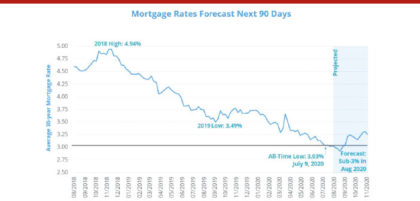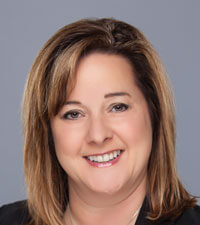Buying a Home
Getting Financing that is Just Right for YOU!
Rather than being affected by short-term fluctuations in the economy, housing markets are largely shaped by longer-term demographic trends. Over the next decade, two generations will dominate activity in the housing market—the millennials (born 1981–2000) and the baby boomers (born 1946–1964). Statistics show that millennials are renting more than ever before, opting for one monthly payment rather than mortgage interest, property taxes, maintenance expenses, and any other costs associated with homeownership. Younger people also have greater student-loan debt than previous generations, so buying a home may seem just too far out of the budget for most. The thing about renting, though, is that you do not get any of your money back when you move. Long-time homeowners build equity that can be useful later in life. A paid-off house is a valuable asset that can be tapped into for college, to start a business, or retirement, to name a few.

Historical Data: Freddie Mac. Projection based on 2020 forecast from 6 housing and financial authorities and the author’s view of the market. Disclaimer: Rates are volatile and will probably be drastically different even from the best projections. (c) TheMortgageReports.com
While COVID was blamed for a decline in existing home sales in March, prices remained strong. In fact, home prices increased in every sales region in the country, as they have for 97 consecutive months, with the median home price in the country increasing 8% for the month compared to March 2019. In the Midwest, that increase was 9.7%, second only to the West, where prices jumped 13.9% year-on-year but sales dropped significantly. National Association of Realtors Chief Economist Lawrence Yun says that while we can expect to see some slight temporary interruptions in home sales in the short term, all signs point to prices continuing to rise.
In early March, the 30-year mortgage interest rate plunged to its lowest level in 50 years, at 3.29%, when the Fed dropped the federal funds rate to zero. Rates have remained in the high 2% to low 3% range since then, sending many homeowners rushing to refinance and lock in the lower rate. We heard stories of lenders across the country being overwhelmed with refinance applications. For people looking to sell homes in Omaha today, the market is ripe with buyers, and financial institutions are keeping busy, for sure.
Because the housing market in Omaha also is one of the most competitive going, it’s more important than ever that people looking to purchase a home get their financing pre-approved so they can submit an offer on their dream house quickly when they find it—because it won’t last. Luckily, Omaha is home to some top-drawer financial institutions that are ready and able to walk you through every step of the financing process to get you the mortgage that works best for you. We talked to three residential mortgage lenders in Omaha recently to get a feel for the types of lending products and services they are offering and the types of home-buying activity they’re seeing.
Union Bank & Trust—which just announced plans to build a second location in Omaha, at the intersection of 144th Street and West Doge Road—offers all of the traditional mortgage products, including conventional, FHA, VA, and USDA loans. They participate in the Nebraska Investment Finance Authority (NIFA) and also offer construction loans and non-owner-occupied investment property loans.
“This year has been a very busy one for purchasing and refinancing homes,” said Union Bank & Trust Vice President of Residential Mortgage Mike Fosdick. “We have not seen any reduction of business due to COVID-19 but we have seen a change in how we provide the lending services. When our lobbies were closed to walk-in customers, for example, we were closing loans in the parking or through our drive-up window.”
When you are thinking about purchasing a home, there are a few things to keep in mind out of the gate. First, be sure you stay within a realistic budget so you will be able to afford to make your payments. Those payments will depend on how much money you have for a down payment. The ideal down payment is 20% of the purchase price, but if a consumer does not have that 20% for a down payment, that should not be a roadblock to purchasing a home. The client can purchase Private Mortgage Insurance (PMI) to make up for the amount that their down payment is below 20%. In addition to a conventional loan with PMI, the FHA, VA, and USDA loan programs can be used if the borrower has less than 20% for a down payment. That said, Mike recommends that anyone considering buying a home have at least 5% of the purchase price in the bank. That should be enough to combine with PMI to cover the minimum down payment and pay the closing costs.
“Of course, good credit is also important in obtaining a mortgage loan,” Mike said. “The better your credit rating, the better your interest rate will be. Credit ratings also will affect the cost of the Private Mortgage Insurance. Just because you have good credit, though, you don’t have to take the maximum loan you can get. Be sure that you know how much of your incomes you can realistically use for housing.
Mike recommends that all first-time homebuyers take a first-homebuyer course, which is available at no cost. It requires a commitment of a couple of hours, but is well worth the time. In addition to seeking the services of a reputable professional realtor, find the bank that has the services you need most.
“Union Bank & Trust is unique when you compare our mortgage business to other companies in the area, in that we have staff underwriters that are part of our Nebraska mortgage team,” Mike said. “Union Bank & Trust also services the majority of our mortgage loans, which means that you are making your mortgage payments to Union Bank & Trust and not to a service company located outside of Nebraska. It’s always a good thing to keep your money in the local economy.”
Centris Federal Credit Union also offers conventional, FHA, and VA financing for home purchases and refinances, in addition to hybrid programs for 100% purchase financing. With the spread of COVID, their staff quickly adapted to a new digital platform, so they can make the home-buying process touchless through virtual meetings, phone calls, and online application that makes the process easy and convenient for everyone involved. Assistant Vice President, Mortgage Services, Heidi Weeks said COVID has not slowed down the home-financing transactions for Centris, thanks to the low interest rates that continue to be available. While buying a home is a big investment, they’ll walk you through every step.
“Whether you are buying your first home or your move-up home, it can feel like a stressful process,” Heidi said. “The loan staff at Centris is here to step you through it all and show you how we can make the home-buying process an exciting and fun experience. Minimum down payments can vary depending on the programs you choose and your credit history. We will help show you the options available and find the best loan fit for you. We welcome first-time buyers—and all buyers—to come visit with us about their goals before they search for that perfect home. We want to ensure they are fully qualified before that search begins. This first step takes away a lot of the stress in the process.”
Centris Federal Credit Union prides itself on having a small-town lender feel with big-city offerings. That means they can provide all of the same financing that the big banks do, but with exceptional service and a local touch. Centris is a not-for-profit financial organization, so they pass the savings on to you.
“Our entire staff all work, play, and service our local communities, Heidi said. “We also services our loans, which our members greatly appreciate. We don’t have stockholders, and any profits we make are turned back to our members in the form of lower rates on loans and higher rates on savings, as well as improved products and services.”
The low interest rates on home loans have kept the folks at Cornhusker Bank busy throughout the pandemic, too. They offer a variety of loan products to suit any borrower’s needs, including everything from a typical 30-/20-/15-year fixed-rate conventional secondary-market home mortgage to an in-house Portfolio Home Equity Line of Credit loan. If you are looking to upgrade from your current home to a more expensive one but haven’t sold your existing home, they also can provide a bridge loan to serve you until your existing house sells.
“The bridge loan gives borrowers time to get their current house sold,” said Cornhusker Bank Vice President, Mortgage Lending, Matt Gutschenritter. “We offer loans that require as little as 5% down payments, and we have a wide array of loan products that, after visiting with a client about their needs, will include a solution for them.”
While people seemed a little hesitant about getting out in public at the onset of COVID, Matt said that home purchases in Omaha have remained strong throughout the pandemic—thanks in great part to the low interest rates. In the current market, it’s crucial that people looking to buy a home get pre-qualified with a financial institution.
“A lot of the home sales of late can be attributed to the low rates that resulted from the COVID pandemic,” he said. “Mortgage rates, for a day or two, hit all-time record lows. This caused a huge surge in the refinance activity, and eventually purchase activity picked up quite a bit, as well. Rates eventually went up some but are still near record lows. Many sellers are seeing very short periods of time that it takes to sell their houses. Buyers are more aware these days that they need to be pre-qualified for their home loan so that they are ready to make an offer on a house as soon as it hits the market. If they are not pre-qualified, many times they will miss out on opportunities to purchase a house that they really wanted.”
According to Matt, when some people think about choosing a mortgage lender, they often think first about which lender can get them the lowest rates. What they will find, however, is that rates from one institution to the next are pretty much the same. With that in mind, there are other qualities to watch for in a lending institution.
“My advice would be to find a lender that will not only help you with the purchase or refinance transaction but will also have your best interests in mind for the life of your loan,” he said. “At Cornhusker Bank, in a majority of cases, we will not sell off the servicing of your loan after the transaction is over. We are set up to retain the servicing of your loan locally. More than likely, at some point during the life of your loan, you will need to contact your loan servicer with a question or concern. Instead of calling an 800 number and talking to someone—hopefully not a machine—consumers call us right here in town to get your questions answered. I also recommend that people ask their friends, family, financial advisors, CPA’s, and the like to see if they have had a past positive or negative experience with a mortgage lender.”
If Matt had one piece of advice to give people who are looking to buy a house, it would be this: Get pre-qualified! Luckily, you can get started from your home, if you choose.
“In recent years, people’s preference for research in selecting a mortgage lender and applying for home loans has trended to using the internet,” he said. “At Cornhuskerbank.com, people can obtain information about the home-loan process, tinker around with some of our mortgage calculators, and even start the loan application itself, if they choose to—all from the comfort of their own home.”
Cornhusker Bank’s local ownership and management allows it to know the market and its needs thoroughly and form lasting relationships with organizations and customers. The new Cornhusker Bank location on Blondo is an indication of the bank’s commitment to serving the Omaha market as both a knowledgeable advisor and good neighbor
If you don’t work in the financial industry, the process for obtaining financing for a new home can seem overwhelming. Clearly, however, Omaha is home to some excellent banking institutions that can walk you through every step of the process and work to get you pre-qualified for a loan. Then you can go and get started on the fun part—finding the house of your dreams!




